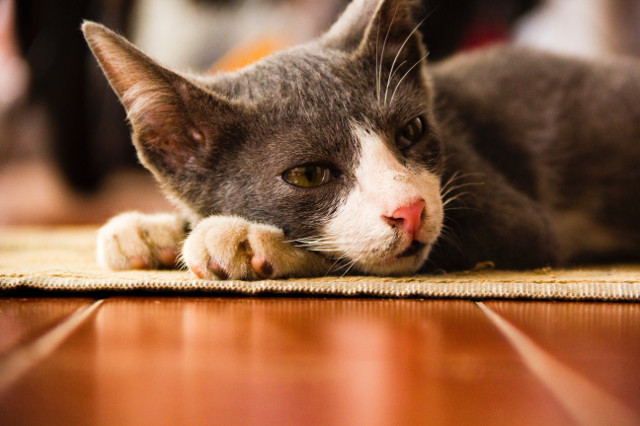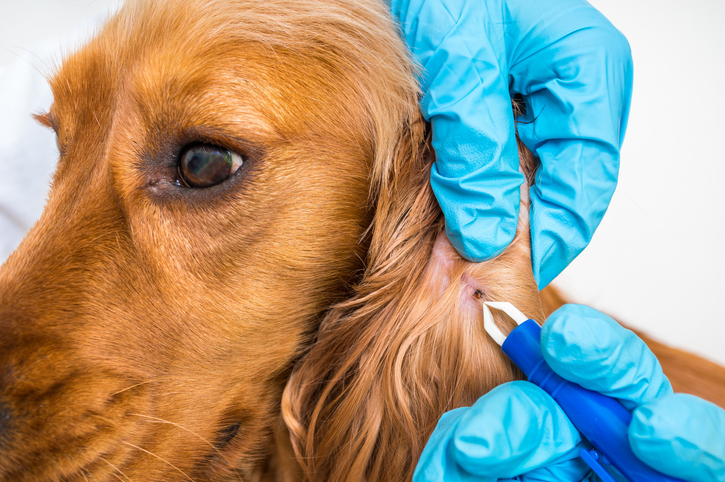Cats are not exactly known for their openness! If you’ve ever had the painful lesson after surprising a cat with a belly rub, you can attest to this fact. Cats can be difficult to read at the best of times, and this is even more true when they’re sick or in pain.
Like you, we are always looking for ways to keep our furry friends safe, healthy, and happy. That’s why it’s so important to go over some of the signs of pain or illness in cats, so that you can identify when there’s a problem, and get them help as soon as possible.
Why All the Secrecy?
After thousands of years of evolution and natural selection, even the friendliest kitties have the instincts of a predator. One of the most important behaviours when it comes to staying alive in the wild is hiding weakness. After all, an animal won’t be so concerned about seeing a cat if it knows they don’t pose as much of a threat. By hiding their pain, cats kept predators at bay and continued to strike fear into the little hearts of rodents everywhere. Additionally, this behaviour would help a wild cat avoid being left behind by their group.
This behaviour makes perfect sense for cats in the wild, but you’d think that with food in the bowl and a nice sunny spot to relax, cats would feel more at ease showing their vulnerable side. However, old habits die hard. Domestic cats may feel that they’ll have to compete for food and water, or even worry that they’ll become a meal for other animals in the home. As much as we wish we could reassure our feline friends that we’ll love them no matter what, the best we can do is keep a careful eye for any of the behaviour listed below.
Symptoms of Cat Pain or Illness
While exact behaviour will differ from cat to cat, there are a few general signs to watch out for. Here are some of the most common symptoms of sickness or pain in cats:
Hiding or Withdrawal
As mentioned before, primal instinct can take over when a cat feels they’re endangered. Wild cats would find hiding spots to rest and recover, keeping them safe from predators and the elements in the meantime. This behaviour often carries over to domestic cats, who will sometimes withdraw from interaction with humans or animals.
Sick cats will prioritize themselves over things they would normally be interested in. This includes socializing with people or other animals, playing with toys, hunting, or any other activities that take a lot out of them. This will all be harder to tell with a cat that’s already more on the aloof side, so pay special attention to their favourite activities and whether your cat is keeping up with them.
Sitting Still
Cats in pain will often move less, particularly if they’re experiencing arthritis or another condition making movement more painful. You’ll notice this if your cat is typically more active, but even their body language can tell you a lot. If they’re hunched up or in an unusual position, there’s a good chance they’re in some discomfort.
Hygiene
Cats are naturally a bit obsessive over their hygiene. Not only is it a relaxing ritual, it helps to stimulate blood-flow, control body temperature, and keep wounds clean. Sick cats will often neglect to groom themselves, so keep an eye out. If their fur is matted and dirty, or if they’re beginning to pick up an odour, there may be something wrong. Additionally, sick cats may over-groom a single spot. This could be a symptom of stress, which often accompanies injury or illness. They could be trying to relieve an itch caused by a rash or other skin condition.
Unusual Noisiness
Cats in pain may make an unusual amount of noise, or even noises that you haven’t heard before. Excessive meowing, crying, and other unusual vocalizations can all be cause for concern. However, these calls won’t always be a clear indicator of discomfort in your cat. Even excessive purring can be a warning sign that something’s wrong.
It’s important to bear in mind that in some cases, excessive vocalization isn’t always a cause for concern. Some breeds, such as Siamese cats, tend to be a bit noisier by default. Likewise, intact cats (cats that haven’t been spayed or neutered) may be louder during mating periods. Vocalizing in the litter box could be an indication of underlying urinary issues or constipation. However, if you’re in any doubt, it’s best to get a professional opinion on your noisy kitty.
Unusual Aggression
It’s no secret that cats can be a bit…unpredictable, even at the best of times. One minute they’re rubbing against you like you’re best friends, and the next they’re in full on ‘psycho-kitty’ mode. This is pretty standard for many cats; however, atypical or extended aggression towards otherwise friendly environments can be a cause for concern. If your cat is being unusually destructive or violent, it may be confused, or aggravated by pain or illness.
‘Accidents’
By instinct, cats like doing their business in private, enclosed places, which is why litter boxes tend to be the go-to for a cat in need. If your cat normally uses their litter box, but then starts going wherever they please, there might be a problem. It’s possible that getting into the litter box has become too difficult for the cat, or perhaps it’s too far away from their current favourite spot.
What to Do If Your Cat is in Pain
The best thing you can do for a cat that’s sick or in pain is to get help from the professionals. You know your cat better than anyone, which makes you the expert on knowing when something is out of the ordinary. If you notice unusual behaviour from your cat, it’s best to see a veterinarian and get to the bottom of what’s causing it.
If you have other animals or small children in the house, do your best to keep rough-housing with your convalescing cat to a minimum. Giving them a peaceful environment will keep stress levels down and help them to heal faster. It will also help your cat trust people more, which is important for keeping an eye on their condition.
One thing to never do is administer any human-intended medication to your cat. Even a Tylenol can make them very sick, or possibly even kill them. Whether it’s painkillers or simply a supplement, you should always check with a veterinarian before giving your cat anything.
How Your Vet Can Help
A veterinarian will help you to interpret the signals your cat is giving you, and determine what exactly is going on. From there, they’ll come up with a treatment plan to get your pet back in top shape. They may recommend medication, supplements or a new diet.
At Hastings Veterinary Hospital, we want to see your cat get back to normal as much as you do. Our dedicated staff offers professional animal care, with the end goal of making your pet feel safe, healthy, and at home. After all, a cat, or any pet, is another member of your family, and we treat them like a member of ours as well.
If you have any questions about pain, illness, or injuries in cats, don’t hesitate to contact Hastings Veterinary Hospital today.
Creative Commons Attribution: Permission is granted to repost this article in its entirety with credit to Hastings Veterinary Hospital and a clickable link back to this page.






